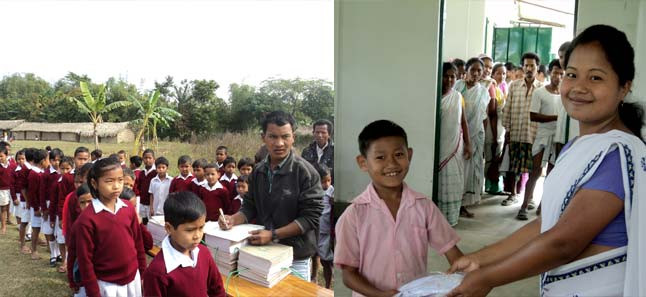Mohong village in Assam's Tinsukhia district has often been in the news in the last decade, mostly for violent incidents. Close to Arunachal Pradesh, it is situated in an area known as a hotbed of militant activity. Today, however, things have vastly improved in this formerly law-and-order-challenged area.
The region has not witnessed any major incidents since 2010. "The social environment in the village has also vastly improved because the influence of local liquor has reduced considerably," shares Rumi Baruah, a local. "People are now leading a more disciplined life; families have been spiritually uplifted. Even our children are pressurizing their parents to abstain from liquor, which is creating a positive impact."
What has galvanized all these changes? The simple idea of opening and running a school, which an ex-militant leader had after meeting a humanitarian leader.
The seed is sown
In 2009, a former ULFA militant met Gurudev Sri Sri Ravi Shankar, a humanitarian leader. Something changed in the former after the meeting. Perhaps it was his violent history that drove a desire for change in society. The ex-militant got in touch with the education committee of The Art of Living, and with time, came a school. "He (the ex-militant) has been a big source of support," says Rumi Baruah, coordinator of the Assam School Committee of the VVMVP schools. "He's even gone on to start one more school in Assam," she adds.
Rumi recalls how shocked the district collector was when they first met him to discuss the project. "He told us that he would never have allowed it and that he was hesitant to let us enter the village because nobody who went in ever returned. We responded that the Art of Living wanted to work in such areas and drive a change."
Nurturing children
Today, the school, with 13 teachers and other support staff, serves some 410 students. Girls marginally outnumber boys, with the ratio being 30:29. The children, who come mostly from low-income families, include (among others) the children of militants or former militants (consciously, no distinction is made among the students). Every child receives free books, uniforms, sweaters, and school bags.
Classes go up to the fifth grade, and the syllabus laid down by the Assam State Elementary Education Board is followed. Other activities include sports, art, songs, dance and drama, quiz, and poetry recitals. A group of children even participates in local Bihu dance competitions.
Kantshar Moran, a parent, shares that the Sri Sri Gyan Mandir changed the village and inspired students to go to school. "It even motivated people like me to send my child to school," he says.
Harbingers of change
The school has also brought about a transformation in the lives of the villagers and the environment of the village. When the idea for the school was mooted in 2009, a public gathering of villagers and prospective guardians was called. "When we started building the school, the villagers started telling us about the transformation that was slowly trickling into the village," shares Rumi. "They are now getting street lights, better roads, and infrastructure."
Kantshar Moran reveals that after the children started going to school, the drug addict count had come down, and there was more responsibility and discipline both in the children and in the community. Adds another parent, "Relationships have improved; mentally, physically, and spiritually, they (children) have started growing." Manmohan Baruah, yet another parent, shares, "I found a few good changes in students of the Gyan Mandir. They have even started guiding us at times. Even they were advising people to leave alcohol."
Such is the effect that neither the children nor the staff face any challenges from the militants. They face only natural calamities during the rainy season due to the heavy floods and waterlogging.
"Everyone has dreams for the school today. They want their children to complete their schooling here," Rumi concludes. The school hopes to expand soon and provide middle and higher secondary education as well.
Even as the school steers so many children toward a path of hope and a new future, the graduates will forever be grateful for the meeting of an ex-militant and a humanitarian leader.
Student voices of hope
“The peace of mind in our village has increased; illegal activities have reduced.” ~ Vatak Moran
“Villagers are very happy with our school because of the reduction of the count of alcoholics in the village as well as the overall development of the students.” ~ Anon
“I feel at home in the school under the guidance of the teachers. All of us help each other.” ~ Juganto Gogoi
Published on: 28th May 2014
Story credit: Written by Sheel Parekh from The Art of Living Bureau of Communication





